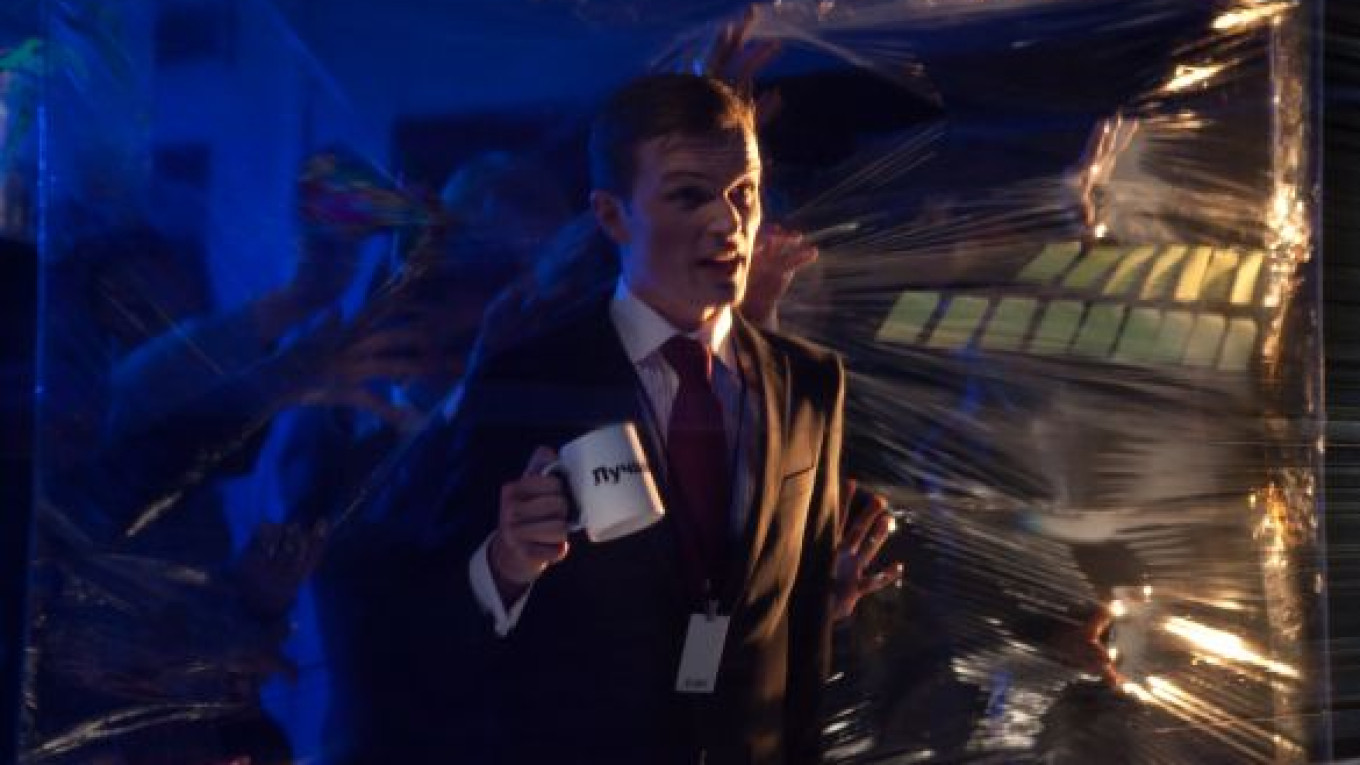Yury Klavdiyev's "The Slow Sword" is a contentious, ambitious play. Alexander Sozonov's interpretation of it at the Playwright and Director Center goes at it with appropriate zeal, creating a production that packs a wallop but can't possibly be to everyone's taste.
That danger is built into the text. Klavdiyev, the ever visceral writer who hails from Tolyatti and now calls St. Petersburg home, made his reputation writing plays and screenplays that are as violent and insolent as they are poetic. His declared affinities are with genre films that span the territory from horror to western, from martial arts to anime.
There is always blood and there is always hell to pay in a Klavdiyev play.
"The Slow Sword," which enjoys its Moscow premiere with this production, has a supremely simple premise. A young, overachieving office worker senses that his life is empty and so he drops out to take the proverbial Hero's journey through the world to see how people really live. His encounters with thieves, addicts, rapists, corrupt policemen and the money-drunk society they create leave him with a bitter resolve that mixes hardcore cynicism with hard won wisdom.
Stylistically and thematically the play could be called an uneven mix of Carl Jung, Dante, Tarantino, Bruce Lee, Homer and Batman. Loaded with violence and obscenities, it is not a "pretty" sight. It's a wake-up call. A shout out to God and Devil.
But it is also very funny at times. At least it is intended to be.
The train wrecks of obscenities piling up – especially when mouthed by three conspiratorial and despicably indifferent taxi drivers (Medved, Konstantin Gatsalov, and Nikolai Machulsky) – are wickedly satirical. The attempts of a young girl (Yulia Skirina) to shoot heroin with the help of a male companion (Yan Ilves) is a comedy of errors that will make some laugh, others turn away in disgust. The very nature of the "heroic" Vlad (Roman Sinitsyn) drifting untouched through a world of iniquity, occasionally stopping to right a wrong, is intentionally humorous.
There's nothing funny about some of this play's elements, however, and that, too, is as planned.
A rape of the young female heroin user is described by the author in crunching, profoundly disturbing language. Please note that I say "described," for Sozonov in his production wisely stages the literature, not the event. As a dreamy, though athletic ballet of the two rapists and their victim unfolds on stage, Klavdiyev's stage directions are read out by a disembodied voice.
The clash of the brutal words and the aesthetically acceptable visual interpretation is effective. It confuses and irritates, yet forces us to continue looking on, which arguably is this play's central goal throughout – to make us see what we may wish not to.
The use of spoken text rather than performed action is employed to beautiful purpose in another, very different, scene as well. This is Vlad's final return home before heading out on a new path altogether. It is a moment of love and connection, a summing up and a farewell that Vlad shares with his girlfriend Alla (Nina Krasnikova).
Klavdiyev's description of the tryst is tenderly poetic and also pornographic. Sozonov allows us to experience the undiluted moment by hiding the actors entirely and allowing Klavdiyev's bracing, honest words to do the job entirely on their own.
This show comprises an ultra-modern sensory attack of music, light and video. The bass lines of Yury Lobikov's electronic music pound so hard your socks rattle on your ankles. The set by Alexei Tseglov consists primarily of cubicles created on stage by swaths of plastic wrap. It suggests bling and it has substance – the people's lives here are transparent even as they are trapped in the webs of their deeds and shortcomings.
One could argue that Sozonov came close to burying his cast in the elaborate visuals. Often kept in the dark by lighting designer Leonid Shirokov, the actors seem almost faceless at times.
Still, Sinitsyn's Vlad floats through it all properly in his bright white shirt, a figure apart. And no description of this production would be complete without a nod to Medved's hilarious though disconcerting performance of a grossly uncouth taxi driver whose virtuoso command of non-standard Russian provides him no help making sense of a wasted life.
This production of "The Slow Sword" probably bites off more than it can chew. But its best moments challenge us in the way that the best art does.
"The Slow Sword" (Medlenny Mech) plays Oct. 30 at 8 p.m. at the Playwright and Director Center, located at 5 Begovaya Ulitsa. Metro Begovaya. Tel. 495-945-3245. .
Related articles:
A Message from The Moscow Times:
Dear readers,
We are facing unprecedented challenges. Russia's Prosecutor General's Office has designated The Moscow Times as an "undesirable" organization, criminalizing our work and putting our staff at risk of prosecution. This follows our earlier unjust labeling as a "foreign agent."
These actions are direct attempts to silence independent journalism in Russia. The authorities claim our work "discredits the decisions of the Russian leadership." We see things differently: we strive to provide accurate, unbiased reporting on Russia.
We, the journalists of The Moscow Times, refuse to be silenced. But to continue our work, we need your help.
Your support, no matter how small, makes a world of difference. If you can, please support us monthly starting from just $2. It's quick to set up, and every contribution makes a significant impact.
By supporting The Moscow Times, you're defending open, independent journalism in the face of repression. Thank you for standing with us.
Remind me later.


